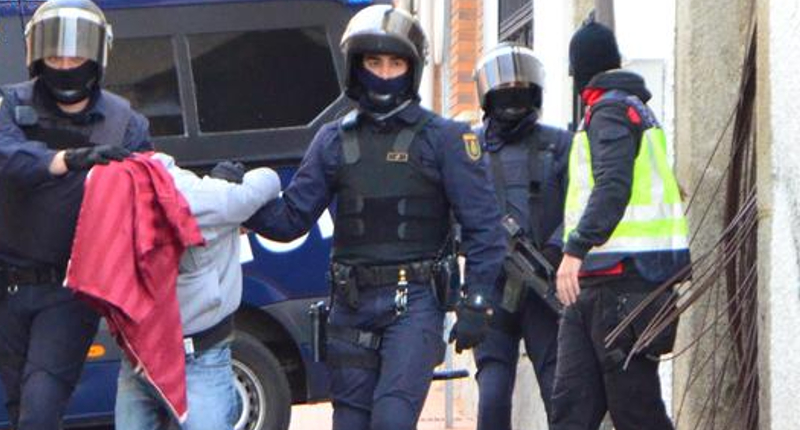Recalibrating U.S. Counterterrorism: Lessons Learned From Spain
Spain's close counterterrorism cooperation with Morocco provides a model for effective international efforts to prevent terrorist attacks.

Editor’s Note: As the United States recalibrates its counterterrorism policy, law enforcement will play an even greater role. Kim Cragin, Michael Bartlett and William Crass of National Defense University point to Spain’s experience as a source of lessons for the United States. The authors describe Spain’s expeditionary use of law enforcement and identify steps the United States can take to improve coordination with foreign partners.
Daniel Byman
***
As the United States seeks to avoid overreliance on military forces to fight terrorism abroad, law enforcement agencies—international and domestic—will play an even more important role. America can learn much from its allies in this regard. Many U.S. allies, such as the United Kingdom and France, have experienced both foreign and domestic terrorist threats to their homelands, and most lack “over-the-horizon” military capabilities to mitigate these threats. Spain, in particular, has developed new and creative approaches to law enforcement in its struggle against terrorism.
Spain’s Expeditionary Forces: Cops and Lawyers
Understudied compared with the United Kingdom or France, Spain’s efforts against al-Qaeda and the Islamic State provide important lessons for the United States as it recalibrates its counterterrorism strategy. Spain has long been a recruitment and facilitation hub for violent jihadists, beginning with support for the mujahideen in Afghanistan during the 1980s and extending through the conflicts in Algeria, Bosnia, Chechnya, Iraq and Syria. It also has been featured in al-Qaeda and Islamic State propaganda, and these groups and their sympathizers have executed terrorist attacks in the Spanish homeland. The most tragic and notable attack occurred on March 11, 2004, when al-Qaeda operatives placed explosives on four commuter trains in and around Madrid’s city center. These coordinated attacks killed 191 individuals and injured more than 1,800.
The network of al-Qaeda operatives responsible for the Madrid attacks stretched across Spain and Morocco. Geography is important in this regard. The southernmost tip of Spain is approximately 10 short miles from Morocco across the Strait of Gibraltar, and Spain also retains two enclaves—Ceuta and Melilla—in North Africa that share borders with Morocco. Significant trade, travel and immigration occur between these two countries. This shared geography provides Moroccan terrorist operatives with relatively easy access to the Spanish homeland and vice versa.
Like with the United States and 9/11, the Madrid bombings caused Spain to revamp its approach to counterterrorism. But, unlike the United States, Spain does not have extensive over-the-horizon military strike capabilities that it can use against terrorist operatives in foreign countries. Moreover, Spain’s counterterrorism strategy needed to address terrorist cells both at home and abroad. To cope with these challenges, it adopted an expeditionary approach, but rather than employing expeditionary military forces, Spain relies on its judicial and law enforcement instruments of national power. Spain’s approach has been largely successful; it has foiled more than 80 terrorist plots since 2013, with only four successfully executed attacks and only one attack with a significant number of casualties.
In Kim Cragin’s January 2020 research trip to Spain, officials expressed a broad consensus that one of the most successful components of Spain’s approach to preventing terrorist plots has been better cooperation between Spanish and Moroccan law enforcement. Accompanied by the exchange of liaison magistrates between the countries’ ministries of justice and a revised criminal code, Spain has been able to build an effective law enforcement-centric approach to counter both foreign and domestic threats to its homeland.
The foundation of Spain’s expeditionary, law enforcement-centric approach is an enhanced relationship between the Spanish National Police Corps (CNP) and the Moroccan General Directorate for National Security (DGSN). Both law enforcement agencies are responsible for investigating terrorist suspects in their respective countries. CNP also stations its officers in Rabat to coordinate with the DGSN to facilitate information sharing on terrorist cells, suspects and plots. But collaboration between the CNP and DGSN goes well beyond information sharing. They also conduct joint operations: The CNP partners with the DGSN inside Morocco, and the DGSN with the CNP inside Spain, to collect evidence and to arrest and interrogate suspects. According to officials, this close coordination has made it difficult for operatives to flee or destroy evidence, contributing to the overall successful arrest and prosecution of al-Qaeda, Islamic State and other terrorist operatives. Joint operations conducted by the CNP and DGSN since 2014 include the following:
- On Aug. 25, 2015, Spanish and Moroccan police arrested 14 terrorism suspects as part of a joint operation in Madrid, Spain, and Fez, Casablanca, Nador, Al Hoceima and Driouech, Morocco. Those arrested were accused of being part of a network that recruited fighters and sent them to join the Islamic State in Iraq and Syria.
- On Dec. 22, 2018, Spanish and Moroccan police worked together to arrest a Moroccan national in Barcelona. He was attempting to enter Spain after serving as a foreign fighter with the Islamic State in Syria.
- On April 9, 2019, Spanish and Moroccan police arrested a 23-year-old man as part of a joint operation in Rabat. The terrorism suspect had plans to conduct a suicide attack in Seville during Holy Week.
- On June 4, 2019, Spanish and Moroccan police worked together to arrest a 30-year-old Moroccan national in Barcelona. He was accused of financing terrorist activities.
- On Oct. 14, 2020, Spanish and Moroccan police arrested two Moroccan nationals in Spain as part of Operation Polygamy. The two men were members of a terrorist cell linked to al-Qaeda that attempted to recruit women to marry al-Qaeda fighters abroad.
These joint operations illustrate the nature and degree of coordination between the CNP and DGSN to arrest al-Qaeda and Islamic State members and dismantle terrorist cells. Some of the arrested individuals were clearly part of operational cells, and others were involved in financing terrorist operations. Many of them are best described as recruiters or propagandists. This represents an important difference between the United States and Spain: The Spanish criminal code allows for the arrest of individuals who glorify terrorism. And, according to a report by the Judicial Documentation Centre, Spanish prosecutors have used this approach extensively. The courts handed down 181 judgments on the offense of glorification of terrorism from 2013 through 2019, with many of them being convictions. The United States does not have similar laws; thus, this component of Spain’s counterterrorism strategy cannot be replicated by U.S. law enforcement.
Beyond joint operations, Spanish officials also contend that the exchange of liaison magistrates between Spain and Morocco has contributed significantly to their overall success in preempting terrorist plots. Liaison magistrates come from the respective countries’ ministries of justice. They understand the legal systems in both countries and so their presence in-country helps to speed the exchange of, or requests for, evidence in the prosecution of terrorists. They also process letters rogatory, which are official requests for legal aid between two nations. These requests have provided the legal basis for Spanish officials to oversee arrests and participate in the interrogation of suspects in Morocco.
Of course, Spain’s counterterrorism strategy has not been completely effective. On Aug. 17, 2017, Younes Abouyaaqoub drove a van onto La Ramblas pedestrian promenade in Barcelona, killing 16 people and injuring an additional 22. It was the most significant terrorist attack in Spain since the Madrid bombing. That same night, Abouyaaqoub’s brother, two cousins and another two individuals drove a vehicle through pedestrians in the Spanish seaside resort of Cambrils. Spanish police later linked the attacks in Barcelona and Cambrils with a prior explosion in Alcanar. It was originally believed that the destroyed house in Alcanar was an illegal drug laboratory, but investigators soon realized that Abouyaaqoub and his accomplices had intended to detonate vehicular improvised explosive devices but accidentally destroyed the canisters in Alcanar and so resorted to driving their vehicles through pedestrians instead.
In interviews and conversations three years later, Spanish officials still viewed the series of attacks as a failure and were seeking new ways to augment their approach. Yet this should not undermine the potential of Spain’s approach, which has preempted numerous attacks and saved lives.
Recalibrating U.S. Counterterrorism
The United States should consider Spain’s success as it recalibrates its counterterrorism strategy 20 years after the 9/11 attacks. Spain’s liaison magistrates represent a good first step. The United States should go beyond legal attachés and short-term advisers, exploring new forms of collaboration and partnerships with foreign ministries of justice. For example, the Department of Justice recently has begun to assess ways that it can assist the U.S. military in its efforts to transfer “battlefield evidence” to partner nations. Foreign prosecutors need this evidence as part of their efforts against terrorists returning from conflicts abroad—particularly Syria, Iraq and Afghanistan. The Justice Department should consider expanding this program by not only placing U.S. prosecutors in more embassies overseas but also welcoming foreign prosecutors to the United States. Moreover, these prosecutors should address threats beyond foreign fighter returnees to include evidence transfers related to other terrorists involved in the recruitment, facilitation, financing or execution of plots against U.S. interests.
Additionally, the Spanish National Police Corps’ relationship with the Moroccan General Directorate for National Security also presents some lessons for the U.S. Federal Bureau of Investigation. The FBI should consider ways that it can expand the nature and extent of its own partnerships abroad, particularly in countries that represent historical transit points (for example, France, Turkey and the Netherlands) for terrorist operatives trying to reach the U.S. homeland. The purpose of these enhanced partnerships should be to speed the transfer of information (and eventually evidence) for preventing cross-border plots and prosecuting their perpetrators. And, along similar lines, the Justice Department, with support from the State Department and Department of Defense, should revisit the International Criminal Investigative Training Assistance Program to see if these partnerships can be modified to better augment existing counterterrorism measures overseas.
The United States is now reevaluating its counterterrorism strategy. At stake is the extent to which it will rely on over-the-horizon military strikes and what the balance should be between military and law enforcement responses to the threat of terrorism. Though U.S. approaches already involve intelligence collection and law enforcement activities, there are other innovative ways to augment over-the-horizon strikes. The Spanish experience suggests that it is possible to adopt a relatively aggressive expeditionary law enforcement approach to counterterrorism and successfully protect the homeland from foreign terrorist threats. No counterterrorism strategy will ever be 100 percent effective, but the United States should take this opportunity to improve its approach.





